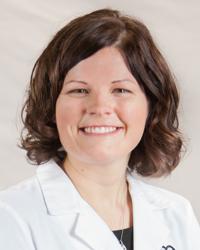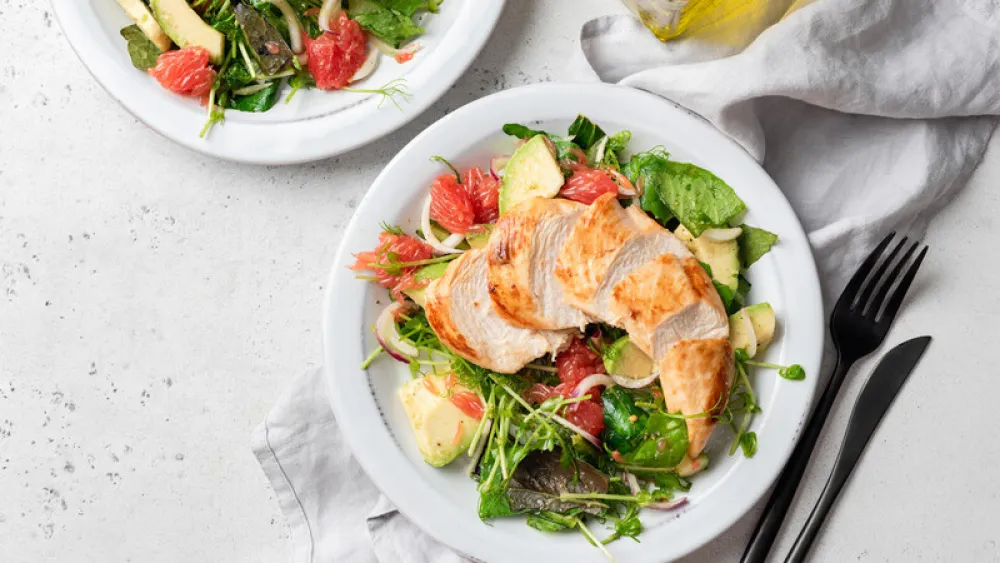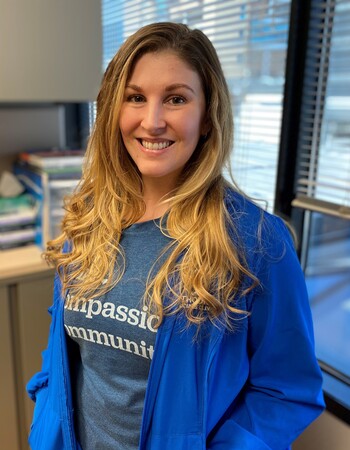





Healthy Lifestyle
Methodist’s Protein and Vitamin Classes Emphasize Importance of Receiving Essential Nutrition
Published: March 28, 2023

Before retiring, Deb Burkholder ran a medical equipment company. Now that she’s no longer working, Deb recently began prioritizing her own health over other people’s.
“I want to be out hiking and doing things that I love to do.”
And one of the ways that Deb, 68, concentrated on her health was by attending protein and vitamin classes offered at Methodist, which aim to help people understand the importance of receiving essential nutrients at every meal.
Introducing New Classes
Methodist’s bariatric surgery program coordinator, Ali Hunter, APRN, NTP, believes that one of the crucial elements of a healthy lifestyle is proper nutrition. And because of this, she received training and gained a certificate as a nutritional therapy practitioner.
During the course, Hunter learned the importance for people to come up with their own goals and self-directed care.
“We try to meet people where they’re at,” Hunter said. “Sometimes people want to make small changes. And others want to make a lot of changes all together.”

Over the years, she’s gained an understanding that people seeking help with their nutrition either don’t look at nutritional labels or feel overwhelmed by them.
Specifically, Hunter discovered that many people aren’t getting enough daily protein, which is why a group class within the bariatric program was created in early 2022.
Nurse navigator Adrianne White, BSN, RN, instructs a class focused on protein that meets twice a month on every other Wednesday. She also teaches a class about vitamins on the opposite Wednesdays.
Depending on the week, anywhere from two to 16 people attend either of the classes.
Deb enjoys the structure of the sessions.
“The classes are kept light, informative and interesting,” she said. “For me, it makes me want to come back for more. If I feed my mind, understand what I’m doing and put that into play, then I’m going to be more successful.”
Protein Builds Muscle, Allows Independence
According to White, protein should be prioritized at every meal. The first step to incorporate more protein into your daily food intake is to look at the nutritional label, search for the protein level and look at how many servings are in the package.
“You can’t build muscle without protein,” White said. “And muscle allows you to be mobile and independent longer. It’s all about your longevity and your independence. I’m very passionate about that.”
White’s passion is evident to Deb.
“She’s really knowledgeable, but she makes it a fun class, which keeps it interesting,” Deb said. “She gives you some valuable information that you need to hold onto.”

One of the biggest goals of the protein class is to equip patients with the tools to eyeball their serving sizes so they know how much protein they’re getting throughout the day without needing a scale or special measuring tool. Attendees are shown multiple examples of photos of what appropriate protein portions look like.
The class also helps patients find easy recipes that are manageable, even for inexperienced cooks or people with a strict food budget.
“I really feel like empowering patients to know what they’re doing when they go to the grocery store,” White said.
And for those who like spending time in the kitchen, the class presents a new perspective.
“I love to cook,” Deb said. “And it gives me some exciting ways to change the way that I’m cooking.”
Vitamin Intake Impacts Well-being
On the Wednesdays opposite of the protein classes, White leads a discussion about the importance of vitamins.
Instead of just telling attendees that they should be taking vitamins or finding foods that are high in particular vitamins, White breaks down what each micronutrient does for the body and gives real-world examples of what it might feel like if you’re not receiving the proper amount of those nutrients.
“I help you understand that if you’re short on vitamin D, that might look like depression. Short on vitamin B12? That might look like pins and needles sensations. Low on iron? That might feel like fatigue,” she said.
White noted that many people tend to begrudgingly take vitamins if they’re simply told, “OK, you have to do this every day,” with little to no context behind the why. She hopes that the information she provides helps people become motivated to want to take vitamins or eat foods that provide essential nutrients.
“It’s one thing to say, ‘Vitamins are really important,’” Deb said. “But it really hit home for me when I could say, ‘Well, this does this for my body.’”
Partnering for Success
Attendees of the protein and vitamin classes are encouraged to bring a partner or friend with them.
Deb said she didn’t bring a friend to either of the classes, but she understands the importance of having someone to partner with during your health journey.
“It’s nice to have a health buddy,” she said. “My husband was mine, so I would go home after the class and go through a lot of stuff with him so he knew exactly where I was at with my plan.”
White believes that offering the classes is essential to helping patients follow their plans.
“Classes are one of the best ways that I can impact their success.”
While Deb is no stranger to focusing on her nutrition, she sees value in the protein and vitamin classes.
“I need the tools to help me gather the information to go forward with this. And that’s what they offer.”
Deb credits White, Hunter and the rest of her Methodist care team as an asset in helping her reach her goals of hiking and traveling during retirement.
“I’m in a partnership with them to improve my health.”
More Resources
- Read similar articles in our Healthy Lifestyle section of the Newsroom.
- Learn about 8 Nutrition and Fitness Apps That Can Help You Achieve Your Goals.
- Explore Methodist’s Nutrition and Weight Management specialty.


